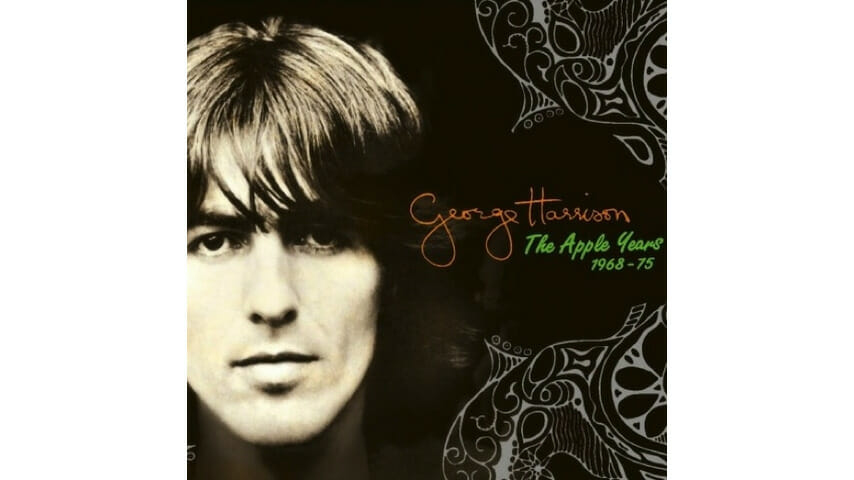George Harrison: The Apple Years: 1968-1975

In the hierarchy of Beatles solo albums, George Harrison’s rank just above Ringo Starr’s increasingly spotty efforts. If it gets mentioned at all, the discussion begins with his 1970 album All Things Must Pass and ends with Cloud Nine, the 1987 release that yielded his last solo hit. The seven albums he recorded between tend to get pushed out of the conversation.
I’m not here to offer up some grand reassessment of the first batch of Harrison’s solo albums, which have been sonically spiffed up and repackaged for the box set, The Apple Years: 1968-1975. The six records within, by and large, are uneven affairs that reveal the late musician at his most self-indulgent and his most spiritually striving.
His indulgent qualities are most blatantly evident in the first two albums of this collection: 1968’s Wonderwall Music and Electronic Sound released the next year. The former is a soundtrack that Harrison put together to accompany the film Wonderwall, a ridiculous artifact of Swingin’ London notable only for the oft-naked form of actress Jane Birkin. Outside of a few moments of psychedelic pop (the great “In The First Place,” recorded with The Remo Four), the work only exists as an attempt to bring the sounds of Indian music to a wider audience. The performances by the sitar, shehnai and table players are lovely enough, but far too short to really convey the music’s hypnotic power. Even more decadent is its follow-up, an album made up of two long cuts where Harrison messes around with his new toy: a Moog synthesizer. It’s a silly thing through and through.
From then on, Harrison went back into a more traditionalist mode, with four albums that delved into themes that have marked almost all the Beatles’ solo work—a yearning for love and world peace—as well as revealing his deeply felt religious beliefs and an off-kilter sense of humor.
All of those concerns are wrapped up in the sprawling, ambitious All Things Must Pass. When released in 1970, it was a massive thing: a triple-LP set packaged in a big box. If you were a record shopper at the time, there was no avoiding this thing. And if you took one home, there was no escaping the music either. These are enveloping songs, padded out by producer Phil Spector and a huge roster of players that included Eric Clapton, members of Badfinger, a young Phil Collins, and Harrison’s former bandmate Starr.
-

-

-

-

-

-

-

-

-

-

-

-

-

-

-

-

-

-

-

-

-

-

-

-

-

-

-

-

-

-

-

-

-

-

-

-

-

-

-

-








































